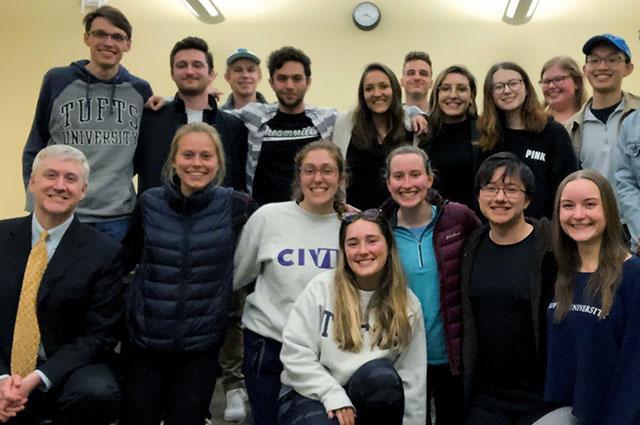"Famous Trials in U.S. History" Moves to Remote Learning

Ian Pilarczyk and students in Famous Trials
Ian Pilarczyk has always had a love and fascination with law. He received his J.D. from Boston University and his LLM and DCL from McGill University, where he researched legal history with a concentration in a comparative Anglo-American-Canadian view. He always wanted a chance to teach a class on famous U.S. trials, and his time teaching at the Fletcher School eventually brought him to the ExCollege — the perfect platform at Tufts for this course.
Using a multidisciplinary approach, Pilarczyk says the course “is premised on the idea that famous trials are ‘mirrors’ into the time and place in which they occurred.” In a setting composed of students with a wide variety of majors and backgrounds, they draw from disciplines such as sociology, criminology, history, and psychology to understand U.S. trials. Instead of a lecture-based structure, Pilarczyk gives students the opportunity to steer the conversation and explore their own interests. They complete an anonymous form at the end of each class, sharing their takeaways and questions. In the next meeting, Pilarczyk chooses some of those responses to guide the discussion.
When asked about his time teaching at the ExCollege, Pilarczyk had nothing but positive things to say. He first taught at the Fletcher School from 2007 to 2009, where he built a strong connection with the Tufts community. His time spent at the Fletcher School only allowed him to teach graduate students, whereas Pilarczyk now engages “thoughtful, articulate, and intellectually curious” undergraduates through his ExCollege courses. This is the fifth semester he’s taught since 2008; Pilarczyk notes that each class is different, but it’s their differences that make them so great.
The course covers a wide range of topics, from the 1692 Salem witch trials to the 2012 George Zimmerman trial. With so many significant and complex cases, Pilarczyk joked that a single case could be taught over the course of the semester. He intentionally asks broad questions to give students multiple access points to the material, but he follows up with questions specific to certain cases and the people significant to those cases.
Pilarczyk’s devotion to his students is clear in his explanation for what they should take from Famous Trials. They should leave with their own perspectives, but if there is one takeaway, it’s that “the only thing we learn from history is that we learn nothing from history,” which is why Pilarczyk emphasizes the importance of studying our past. Margaret Urheim, a senior studying Computer Science and Environmental Studies, said that her experience in this class has “far exceeded her expectations.” It has opened her eyes “to the impact of the U.S. judicial system,” and it has exposed her “to some of the most influential moments in our nation’s history.” Urheim continued by saying that although the transition to online classes did cause some disruption, “the objectives of the course are certainly still being met.”
Given the unique circumstances of virtual learning and the realization that the remainder of the semester would be taught online, it was fitting to check in on Famous Trials in U.S. History after their first online class. Pilarczyk is trying to keep much of the class the same as it was in person, and excitedly shared how dedicated the students were when the class had full attendance — even with a student from Germany, who stayed up until midnight to attend. Pilarczyk is also using the discussion board feature on Canvas to facilitate conversations asynchronously and provide a new way for students to fill out their end-of-class forms.
Understandably, the class took some time to regroup and focus; the news that they would not be meeting in person again was still setting in and was devastating to many. Yet even with the uncertainty of the weeks to come and the disruption in the semester, it’s clear how dedicated Ian Pilarczyk and his students are to finishing the semester strong with a positive and creative environment.
About the Author
Grace Prendergast is a first-year student from Evanston, Illinois, studying Biology. She enjoys reading, listening to music, and hanging out with friends in her free time.